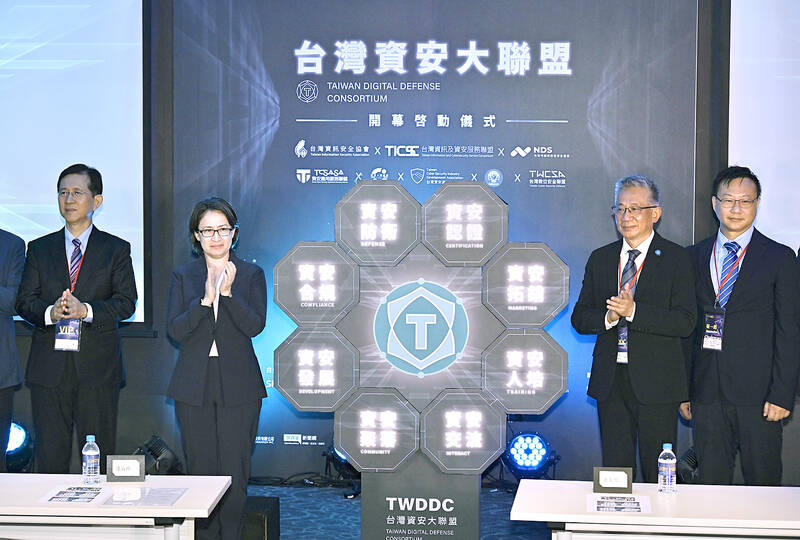The government must make the cybersecurity budget a top priority and avoid compromising national security because of politics, members of the Taiwan Digital Defense Consortium said on Monday.
The consortium was formed last year by eight cybersecurity advocacy groups: the Taiwan Information Security Association, the Taiwan Cyber Security Application Services Alliance, the Taiwan Cyber Security Industry Development Association, the Next Digital Security Cluster, the Taiwan Cyber Security Alliance, the Association of Cybersecurity Talents Cultivation, the Declaration of Hackers and the Taiwan Cyberspace and Cybersecurity Policy Development Association.
The consortium issued a statement ahead of cross-party negotiations yesterday, with Legislative Speaker Han Kuo-yu (韓國瑜) to facilitate discussions over how to resolve a deadlock between the executive and legislative branches caused by a comprehensive budget cut.

Photo: Tu Chien-jung, Taipei Times
“Cybersecurity is not only a line of defense for the corporate world, it is also the pillar that safeguards national security, as well as the nation’s key infrastructure and economy,” the statement said.
“With an increase in cybersecurity threats around the globe, Taiwan needs stable and long-term support from the government to ensure continual development of its cybersecurity industry, and to build a resilient cybersecurity defense system,” it said.
“As such, the budget related to cybersecurity projects must be a top priority, which should not be affected by political factors,” it added. “We hope that legislators could quickly reach a consensus so that budget plans that can help Taiwan can be passed.”
The consortium said that its members visited Vice Premier Cheng Li-chun (鄭麗君), with Democratic Progressive Party Legislator Lin Chu-yin (林楚茵) attending the meeting.
Cheng agreed with the consortium’s vision of turning Taiwan into a global leader in the cybersecurity industry for the “smart era,” the consortium said, adding that she also pledged support to help integrate security resources from the government and industry.
The government needs to bolster cybersecurity policies, as the development of the digital economy also has risks, the consortium cited Lin as saying.
She also promised to help build a more well-rounded cybersecurity environment by proposing bills and funding for cybersecurity programs, it added.
Consortium chairman Tim Tu (涂睿珅) said that it is introducing a Cybersecurity Industry Action Plan 2.0, with the goal of building Taiwan into a research, development and innovation hub of cybersecurity in the Asia-Pacific region.
“Aside from innovation, Taiwan’s cybersecurity industry needs government support and partnerships among industry operators to establish itself as a global leader,” Tu said.

The High Prosecutors’ Office yesterday withdrew an appeal against the acquittal of a former bank manager 22 years after his death, marking Taiwan’s first instance of prosecutors rendering posthumous justice to a wrongfully convicted defendant. Chu Ching-en (諸慶恩) — formerly a manager at the Taipei branch of BNP Paribas — was in 1999 accused by Weng Mao-chung (翁茂鍾), then-president of Chia Her Industrial Co, of forging a request for a fixed deposit of US$10 million by I-Hwa Industrial Co, a subsidiary of Chia Her, which was used as collateral. Chu was ruled not guilty in the first trial, but was found guilty

DEADLOCK: As the commission is unable to forum a quorum to review license renewal applications, the channel operators are not at fault and can air past their license date The National Communications Commission (NCC) yesterday said that the Public Television Service (PTS) and 36 other television and radio broadcasters could continue airing, despite the commission’s inability to meet a quorum to review their license renewal applications. The licenses of PTS and the other channels are set to expire between this month and June. The National Communications Commission Organization Act (國家通訊傳播委員會組織法) stipulates that the commission must meet the mandated quorum of four to hold a valid meeting. The seven-member commission currently has only three commissioners. “We have informed the channel operators of the progress we have made in reviewing their license renewal applications, and

Taiwan People’s Party (TPP) Chairman Huang Kuo-chang (黃國昌) yesterday appealed to the authorities to release former Taipei mayor Ko Wen-je (柯文哲) from pretrial detention amid conflicting reports about his health. The TPP at a news conference on Thursday said that Ko should be released to a hospital for treatment, adding that he has blood in his urine and had spells of pain and nausea followed by vomiting over the past three months. Hsieh Yen-yau (謝炎堯), a retired professor of internal medicine and Ko’s former teacher, said that Ko’s symptoms aligned with gallstones, kidney inflammation and potentially dangerous heart conditions. Ko, charged with

Taiwan-based publisher Li Yanhe (李延賀) has been sentenced to three years in prison, fined 50,000 yuan (US$6,890) in personal assets and deprived political rights for one year for “inciting secession” in China, China's Taiwan Affairs Office spokesman Chen Binhua (陳斌華) said today. The Shanghai First Intermediate People’s Court announced the verdict on Feb. 17, Chen said. The trial was conducted lawfully, and in an open and fair manner, he said, adding that the verdict has since come into legal effect. The defendant reportedly admitted guilt and would appeal within the statutory appeal period, he said, adding that the defendant and his family have